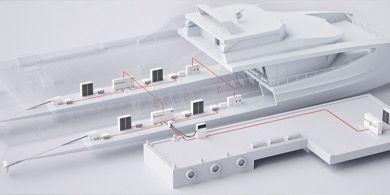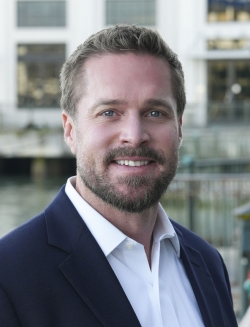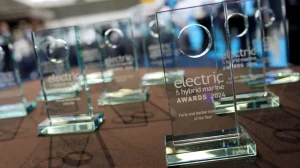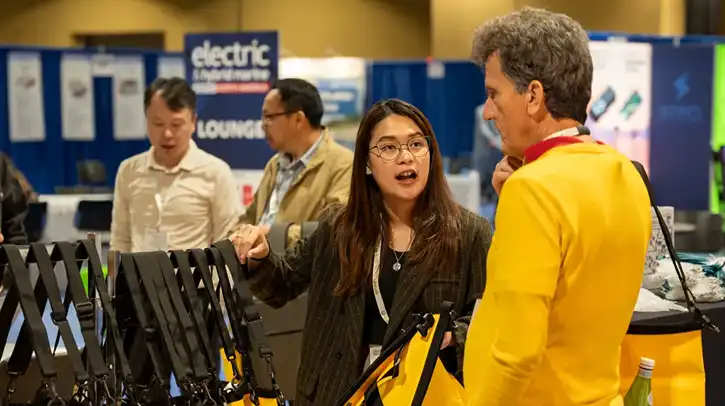Electric & Hybrid Marine Expo North America, the world’s leading exhibition and conference dedicated to the very latest electric and hybrid marine propulsion technologies, is coming to Chicago on August 20 and 21, 2025.
Electric & Hybrid Marine Expo North America
Attended by shipowners and operators, boat builders, shipyards, retailers of recreational vessels, propulsion system designers and manufacturers, naval architects, military fleet operators/chiefs and port operators, this free-to-attend event will feature state-of-the-art technological advances, facilitate strategic networking connections and examine key regulatory challenges.
Addressing the needs of the North American market, Electric & Hybrid Marine Expo is a must-attend for those responsible for the purchase and specification of marine charging infrastructures, vessel engines and components. )
Register now for this free-to-attend expo in Chicago on August 20 and 21, 2025.
Electric & Hybrid Marine Expo North America
With over 150 world-class innovators participating, visitors will have the chance to discover a full ecosystem of technologies driving the future of clean maritime propulsion directly from experts on hand. Solution providers like Twin Disc and BorgWarner and more will be on the show floor presenting the latest technology breakthroughs, covering everything from energy storage and powertrain components to system integration, onboard power management and shore-side charging infrastructure.
) A wealth of innovative technologies will be on show, including an advanced propulsion solution, next-generation maritime battery systems, and a 25-knot 200-passenger electric ferry.
A wealth of innovative technologies will be on show, including an advanced propulsion solution, next-generation maritime battery systems, and a 25-knot 200-passenger electric ferry.
Cavotec will introduce the MCS Manual Dispenser, a compact, plug-and-play system for manual charging of electric and hybrid vessels that is ideal for ports seeking a straightforward, scalable charging solution as it enables safe and easy connection of high-power electrical systems.
ABB will be showing its Compact Onboard DC Grid at the expo. The flexible, space-saving power system is well suited for fully electric, hybrid and PTO/PTI configurations. Tailored for vessels with limited installation space – such as catamarans and workboats – it enables easy integration of low-emission energy sources, battery storage and charging systems. With a modular design, small footprint and standardized components, the system ensures quick, reliable installation and future-proof scalability. 
) Dewesoft will display its first multichannel, high-voltage-isolated thermocouple module, purpose-built for safe and accurate temperature measurements in high-voltage environments. Designed specifically for applications such as e-mobility, battery validation and thermal runaway testing, the IOLITEi-4xTH-HV is a four-channel module that ensures operator safety with CAT II 1,000V isolation between channels and ground.
Dewesoft will display its first multichannel, high-voltage-isolated thermocouple module, purpose-built for safe and accurate temperature measurements in high-voltage environments. Designed specifically for applications such as e-mobility, battery validation and thermal runaway testing, the IOLITEi-4xTH-HV is a four-channel module that ensures operator safety with CAT II 1,000V isolation between channels and ground.
Electric & Hybrid Marine Expo North America Conference
Taking place across the same two days as the exhibition, Electric & Hybrid Marine Conference North America 2025 will draw together maritime innovation and technology experts, government officials, policy experts, researchers, and port and vessel owners to discuss practical ways to implement marine electrification and hybridization. The program will delve into the key issues, enabling in-depth discussions on commercial and strategic topics.
Register here for your delegate pass today.
)
Session topics include: the electrification of workboats; ferry and passenger boat electrification; the challenges of system integration; shore power and port infrastructure; incentives and regulations; vessel and project case studies; alternative fuels and energy sources; developments in battery ESS; as well as a four-part battery short course and batteries panel Q&A.
 For those looking for the latest insights into US regulations in the marine electrification space, Galen Hon, from the office of environment and innovation at the United States Department of Transportation, Maritime Administration, will give a presentation called, Future of shipbuilding and ship electrification in the United States. Similarly, Antonio Santos, federal climate policy director at Pacific Environment, will give a presentation titled US legislation and federal programs that support ferry and harbor craft decarbonization. And Jamie Yates (left), climate and renewable energy analyst for Pacific Environment, will discuss Electrification, hybridization and emissions reducing technology and fuels – Order of operations.
For those looking for the latest insights into US regulations in the marine electrification space, Galen Hon, from the office of environment and innovation at the United States Department of Transportation, Maritime Administration, will give a presentation called, Future of shipbuilding and ship electrification in the United States. Similarly, Antonio Santos, federal climate policy director at Pacific Environment, will give a presentation titled US legislation and federal programs that support ferry and harbor craft decarbonization. And Jamie Yates (left), climate and renewable energy analyst for Pacific Environment, will discuss Electrification, hybridization and emissions reducing technology and fuels – Order of operations.
 For more on the academic side of vessel electrification, Shashwat Tripathi, postdoctoral appointee at the Argonne National Laboratory, will give a presentation on Lifecycle emissions and cost analysis of ferry electrification, drawing on his work in which he performed a novel cradle-to-grave lifecycle analysis (LCA) of ferry electrification, including the fuel and vessel lifecycle emissions and cost. A battery-electric ferry was conceptualized for comparison against a current diesel-powered ferry in the Washington State Ferries system. Results indicated that ferry electrification reduced lifecycle emissions of greenhouse gases (81%), particulate matter (81%) and nitrogen oxides (95%) but increased sulfur oxides emissions (56%) and lifecycle cost (14%). Major ferry electrification hurdles were onshore charging infrastructure, battery life, cost and environmental impacts. With sufficient economic incentives, ferry electrification could help reduce inland marine emissions.
For more on the academic side of vessel electrification, Shashwat Tripathi, postdoctoral appointee at the Argonne National Laboratory, will give a presentation on Lifecycle emissions and cost analysis of ferry electrification, drawing on his work in which he performed a novel cradle-to-grave lifecycle analysis (LCA) of ferry electrification, including the fuel and vessel lifecycle emissions and cost. A battery-electric ferry was conceptualized for comparison against a current diesel-powered ferry in the Washington State Ferries system. Results indicated that ferry electrification reduced lifecycle emissions of greenhouse gases (81%), particulate matter (81%) and nitrogen oxides (95%) but increased sulfur oxides emissions (56%) and lifecycle cost (14%). Major ferry electrification hurdles were onshore charging infrastructure, battery life, cost and environmental impacts. With sufficient economic incentives, ferry electrification could help reduce inland marine emissions.
 Lucian Go, environmental program manager for maritime decarbonization at the Port of Seattle, will provide some practical lessons learned from hands-on deployment experience in the Electrical capacity planning for ports – partnering with utilities presentation. In this session, Go will give an overview of the Port of Seattle’s recently-completed Seattle Waterfront Clean Energy Strategy – a roadmap for electrical infrastructure investments necessary to achieve a zero-emissions waterfront, which was completed through a partnership with municipal utility Seattle City Light and the Northwest Seaport Alliance.
Lucian Go, environmental program manager for maritime decarbonization at the Port of Seattle, will provide some practical lessons learned from hands-on deployment experience in the Electrical capacity planning for ports – partnering with utilities presentation. In this session, Go will give an overview of the Port of Seattle’s recently-completed Seattle Waterfront Clean Energy Strategy – a roadmap for electrical infrastructure investments necessary to achieve a zero-emissions waterfront, which was completed through a partnership with municipal utility Seattle City Light and the Northwest Seaport Alliance.
 Seamus Murphy, executive director of San Francisco Bay Ferry, will look at Bridging the gap: advancing battery-powered high-speed passenger ferries. This presentation will examine the advances and hurdles in the electrification of high-speed passenger ferries. Murphy will explore recent case studies showcasing incremental progress in speed and capacity, analyze evolving lithium-ion battery technologies – including the implications of the NMC811 chemistry – and discuss the trade-offs between energy density and charge rates. A key focus will highlight lessons learned from past incidents, emphasizing safety considerations in battery system design. Also covered will be the potential of direct current (DC) rapid-charging to support these high-speed operations. By shifting key charging infrastructure shoreside, DC charging can enable significant onboard weight reductions and faster turnaround times. Attendees will gain a deeper understanding of the evolving technologies, regulatory considerations and engineering solutions that will shape the next generation of maritime electrification.
Seamus Murphy, executive director of San Francisco Bay Ferry, will look at Bridging the gap: advancing battery-powered high-speed passenger ferries. This presentation will examine the advances and hurdles in the electrification of high-speed passenger ferries. Murphy will explore recent case studies showcasing incremental progress in speed and capacity, analyze evolving lithium-ion battery technologies – including the implications of the NMC811 chemistry – and discuss the trade-offs between energy density and charge rates. A key focus will highlight lessons learned from past incidents, emphasizing safety considerations in battery system design. Also covered will be the potential of direct current (DC) rapid-charging to support these high-speed operations. By shifting key charging infrastructure shoreside, DC charging can enable significant onboard weight reductions and faster turnaround times. Attendees will gain a deeper understanding of the evolving technologies, regulatory considerations and engineering solutions that will shape the next generation of maritime electrification.
Read more of the top presentations to catch at Electric & Hybrid Marine Expo North America here.
Electric & Hybrid Marine Awards 2025
 Alongside all this, the Electric & Hybrid Marine Awards ceremony will be held at the expo, honoring the world’s finest innovations, products and engineers in the electric and hybrid marine arena. The independent, international judging panel of industry experts and academics will announce the winners at 5:00pm on Day 1 of Electric & Hybrid Marine Expo.
Alongside all this, the Electric & Hybrid Marine Awards ceremony will be held at the expo, honoring the world’s finest innovations, products and engineers in the electric and hybrid marine arena. The independent, international judging panel of industry experts and academics will announce the winners at 5:00pm on Day 1 of Electric & Hybrid Marine Expo.
For those driving maritime electrification and decarbonization, the expo will provide a global platform of experts forging partnerships for a progressive and more efficient maritime sector.
REGISTER NOW for your free exhibition entry pass and check out the latest conference program for Electric & Hybrid Marine Expo North America 2025.



